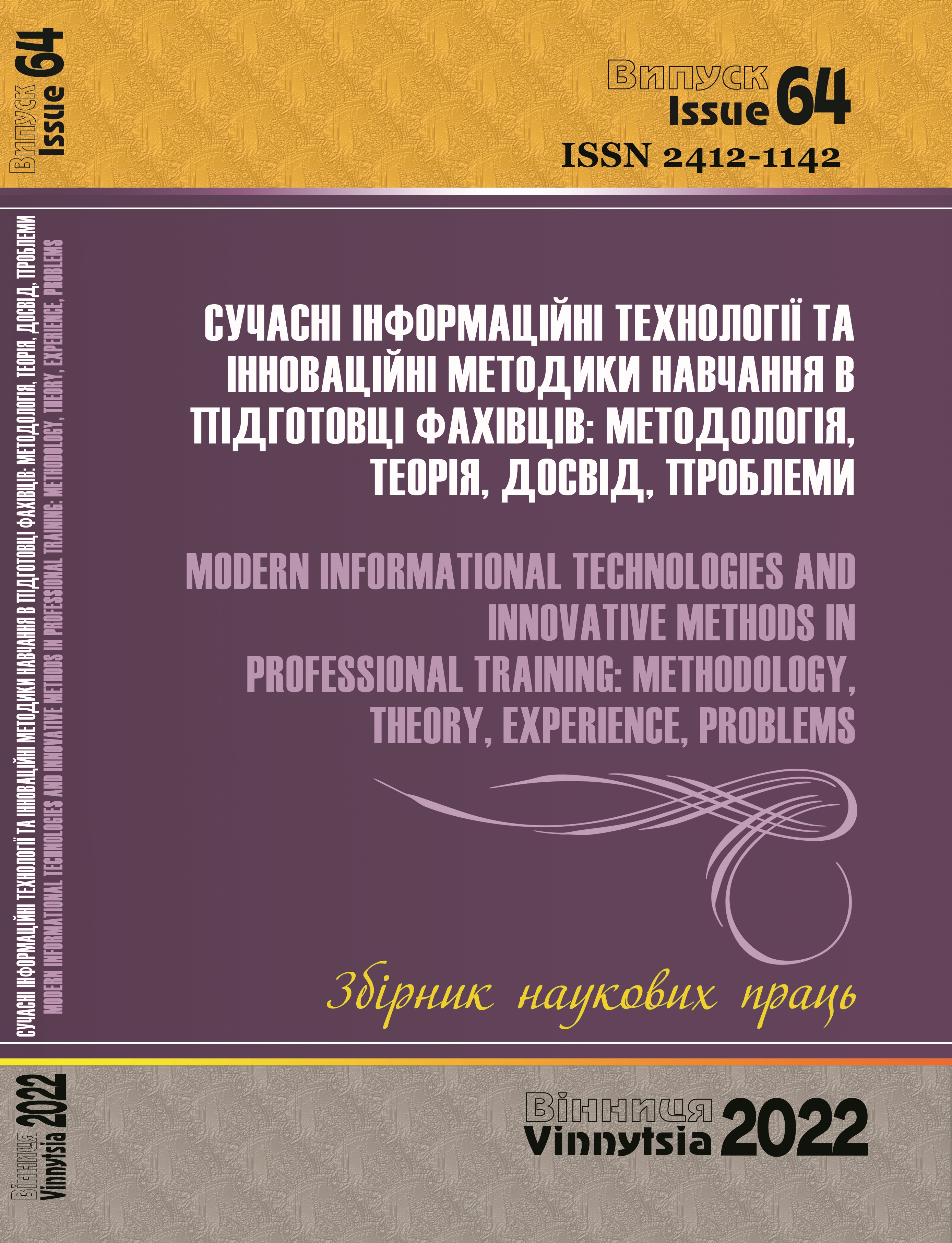IMPLEMENTATION OF THE EDUCATIONAL ASPECT OF MATHEMATICS LESSONS IN THE NEW UKRAINIAN SCHOOL
Keywords:
initial mathematics course, mathematics lesson in primary school, educational purpose of the lesson, ConceptAbstract
In the article an attempt is made on the basis of the revealed features of realization by the
teacher of elementary school of the educational purposes at a lesson of mathematics to formulate
recommendations on increase of efficiency of this process. Emphasis is placed on the powerful potential
of the content of the initial course of mathematics in the education of primary school children. Among the
analyzed ideas of scientists on the formulation and implementation of educational goals in the lesson the
controversial ones are highlighted – those of the scientists V. Bondar and S. Amonashvili. The results of
the survey of primary school teachers conducted in November 2021 are analyzed. The results of the
questionnaire make it possible to confirm that the primary school teachers who took part in the survey: a)
understand the expediency of the diversity of the educational process, which is one of the requirements of the Concept "New Ukrainian School"; b) tried to implement educational tasks in mathematics lessons
before the implementation of the NUS Concept (28.6% of respondents); c) implement most effectively
the principle of personal approach and connection of education with life and work. Examples of
educational influences on children in the process of forming skills of numbers (ordinal, chaotic), solving
plot problems, work of children in small groups are considered. Some advice is given to primary school
teachers on the potential of the content of the primary course of mathematics, covering: the presence of
partnerships with participants in the educational process (students and parents), deep, systematic and
comprehensive study of individual characteristics of children, increasing the percentage of problemsolving methods in mathematics. reproductive and explanatory. Areas of further research are determined:
to identify the state of implementation of teachers' personal approach to children in mathematics lessons
(their choice of methods and techniques) and to find approaches to implementing the principles of social
orientation of education, unity of consciousness and behavior in education, unity of pedagogical
requirements of school, family and society (which teachers are the least able to implement – on the basis
of the survey).
Downloads
References
Коровкіна І. (2015). Виховний потенціал уроку математики в сучасній початковій школі. Збірник
матеріалів Всеукраїнської науково-практичної конференції. Кривий Ріг : КПІ ДВНЗ ,,КНУ”. С. 39-40.
Бондар В. (1994). Підготовка майбутніх вчителів початкової школи до роботи з підручником на уроках
математики: навч. програма спецкурсу. К., 124 с.
Богданович М., Козак М., Король Я. (2006). Методика викладання математики в початкових класах:
Навч. пос. 3-є вид., перероб. і доп. Тернопіль: Навчальна книга «Богдан». 336 с.
Онопрієнко О. (2015). Урок математики у початковій школі: мета, завдання, структура. Початкова
школа, 1. – С. 4-9.
Гуменникова Т. (2009). Підготовка вчителя до особистісно орієнтованого виховання молодших школярів.
Початкова школа, 4. C. 47-50.
Горондич Л. (2014). Виховний потенціал уроку в сучасній системі національної освіти. Балаклія. 36 с.
Прокоп Ї. (1999). Урок як основна форма організації навчальної діяльності школярів і його виховна
цінність. Науковий вісник Чернівецького університету. Педагогіка та психологія, 67. Чернівці: Рута.
С. 167-172.
Савченко О. (2015). Мета і результат уроку в контексті компетентнісного підходу. Початкова школа, 3.
С. 10-15.
Хуторской А. (2001). Современная дидактика : учебник для вузов. СПб. : Питер. 544 с.
Амонашвілі Ш. (1986). В школу – з шести років. М. : Педагогіка. 1986. 226 с.
Якиманская И. (2000). Технология личностно-ориентированного образования. М.: Сентябрь. 188 с.
Сухомлинський В. (1977). Павлиська середня школа ; Розмова з молодим директором. 640 с.
Матвієнко О. (2006). Виховання молодших школярів: теорія і технологія. К.: Стилос. 543 с.
Дидактико-методичне забезпечення контролю та оцінювання навчальних досягнень молодших школярів на засадах компетентнісного підходу: монографія / Савченко О. Я., Бібік Н. М., Онопрієнко О. В. та ін. К.: Педагогічна думка, 2012. 192 с.
Коломієць А. (2007). Математична гармонія природи: кн. для вчителя. Вінниця: ТОВ «Ландо ЛТД». 235 с.
Демченко О. (2009). Проблеми використання проектної технології у навчально-виховній роботі з молодшими школярами. Збірник наукових праць БПДУ. Педагогічні науки,2. С. 61-70.
Микичур, Т. (2012). Проблема гуманно-ціннісного виховання дітей у педагогічній спадщині
В. О. Сухомлинського. Збірник матеріалів регіональних педагогічних читань. Вінниця: ВДПУ ім. М. Коцюбинського. С. 128-129.
Downloads
Published
Issue
Section
License
Copyright (c) 2022 Алла Коломієць, Тетяна Білик

This work is licensed under a Creative Commons Attribution 4.0 International License.

